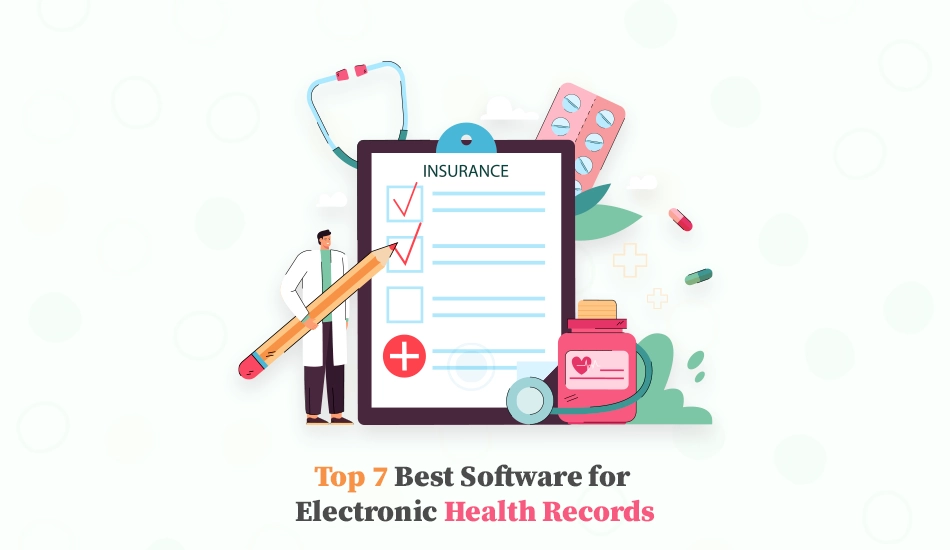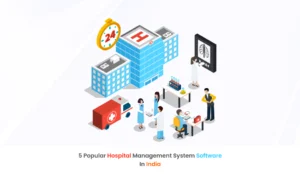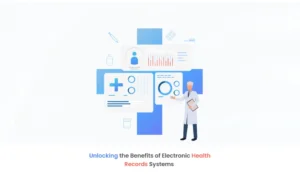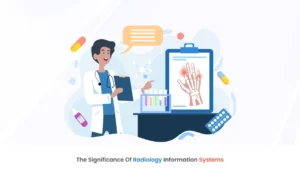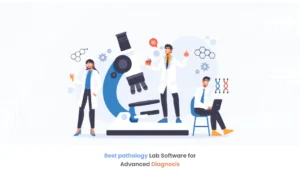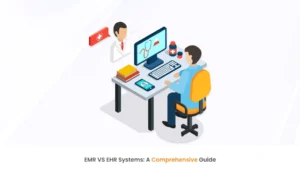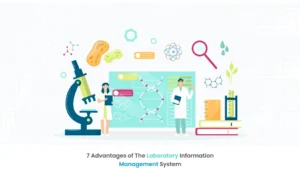Quick Summary: Discover the top 7 electronic health record software solutions, streamlining patient information management, enhancing healthcare coordination, and providing robust tools for healthcare professionals to deliver efficient and high-quality patient care.
Introduction
Electronic health records are at the core of the healthcare system in the modern world. But they became mainstream around the year 1980s. Later, this technology saw massive adoption in countries like the United States, Australia, New Zealand, the United Kingdom, and the Netherlands. These adoptions were at a very high rate, above 90%.
A study conducted around cost-benefits shows that if you have an eye on the five years, EHR is known to offer $86,400 ROI per provider.Additionally, roughly speaking, $17,280 is spent year on staff for each primary care clinician. The electronic health records market is growing with each passing day.
And this is not it. A study conducted in 2011 by NAMCS Physician Workflow has proven that healthcare providers agree using EHR can enhance patient care by almost 78%. It is known to assist them with getting patient charts on a remote basis by 81% and get alerts of mis-prescriptions by 65%. The market offers a wide variety of electronic health record formats. Understand what EMR/EHR is to make a better choice among options.
If you are a healthcare organization and want to take your step towards this beautiful technology EHR, it’s pretty sure that you might have many questions. These questions can be like:
Should we go for a cloud-based system or on-premise deployment?
Does the EHR provider we choose have the expertise, or will we need to assist them with oversight?
What are the costs that you can expect for EHR implementation as per the size of the facility?
How can you ensure compliance with laws after going digital?
How can you teach your employees to cope with EHR?
This article will help you as a comprehensive guide for knowing how this EHR will help your medical institution along with its features. You will also get to see the list of top EHR software to choose from in 2024. Let’s begin this journey.
What is electronic health records software?
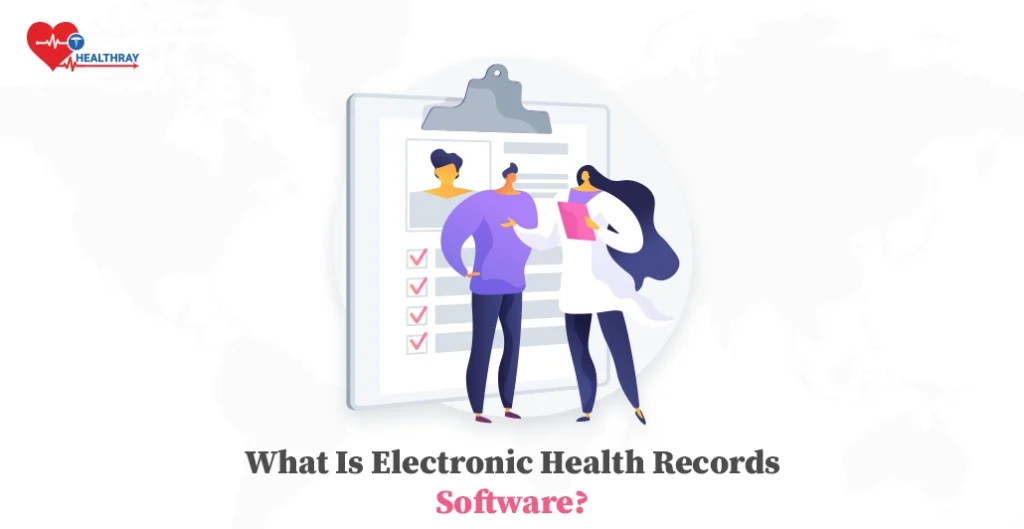
A platform called EHR, or electronic health records solution, offers multiple copies of a patient’s medical records. These copies encompass details such as their prescriptions, history, test results, notes of improvement, immunization records, etc.
This platform helps healthcare experts collaborate among different departments and organizations to eliminate all medical errors and keep and access all patient data with ease. It can also lessen the chances of hazards such as misprescriptions or significant contraindications. Hence, EHR software is one of the primary technologies that ensure healthcare’s digital transformation.
EHR is health information technology made to not limit its usage only to the collection of patient data. It goes way beyond data collection and expands to the broader concept of patient care. It is, as mentioned, a vital part of IT in healthcare as it helps with the following:
Storing patient medical history, medications, diagnosis, treatment line, dates of immunization, laboratory reports, and much more.
Availability of evidence-based resources that support professionals in making wise treatment decisions.
Enhance and automate the workflow at the provider’s office.
One of the most compelling features of EHR is that creating and managing healthcare information can be done by authorized healthcare providers. It is also developed in a way to store and share information with other departments and physicians involved in the process. Hence, this improves the quality of care.
What are the critical features of EHR Software?
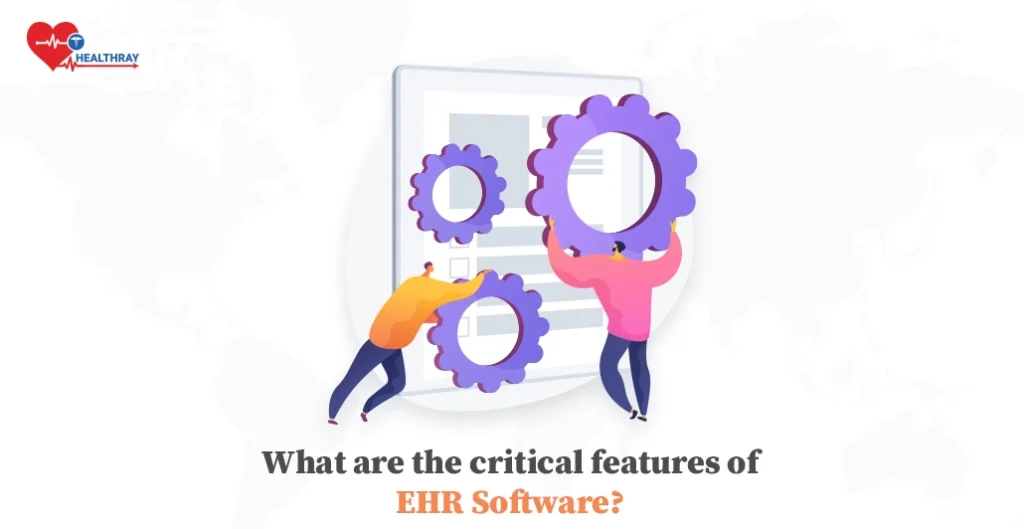
What characteristics need to an electronic health record system have? And do you know how EHR will affect the workflow of your organization? An EHR can function as a secondary brain of your organization. It can keep storage of patient health information in bulk, book and track your appointments, and adopt best practices for diagnosis and treatments. It can also be helpful in getting reminders for patient care.
- Digital charts: An electronic health record will collect all the healthcare histories of patients using electronic technology. It can help providers track diagnoses, allergies, tests, and medical imaging.
- Innovative prescriptions: When a doctor uses an online prescription, it is easily viewable at the pharmacy by using simple buttons. It also syncs with the more significant healthcare databases to avoid chances of contradictions. As a result, it can recommend the best dosages of medication for a patient that a doctor has prescribed.
- Alerts: EHRs can help people take care of patients, and nurses administer medication to patients to ensure that they are given the right drug.
- Automated scheduling: Electronic health records tools can help in integration with the hospital’s scheduling system. Hence, it keeps patient appointments up to date.
Top Advantages of EHR software
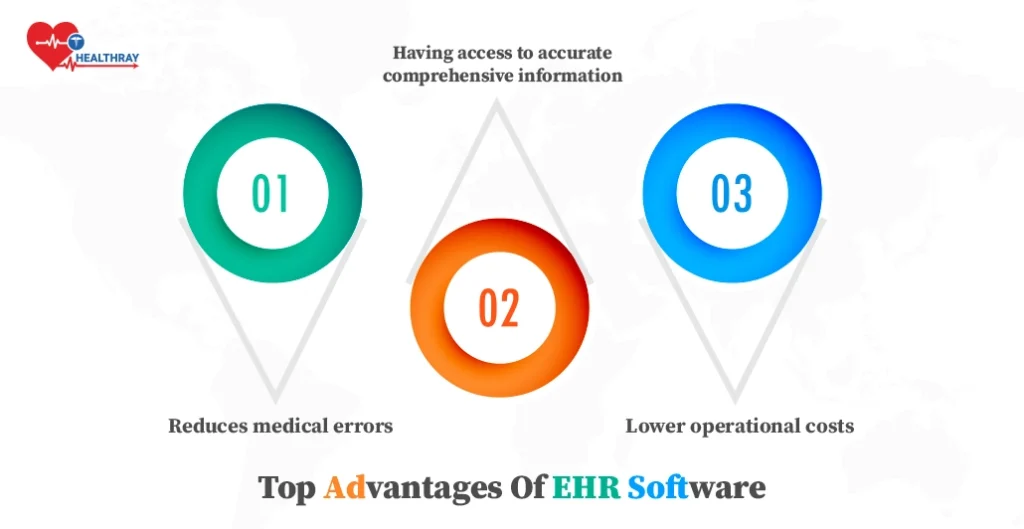
Are you eager to explore the benefits of electronic health records systems for health information? Here’s a list of the benefits of electronic health records in healthcare:
Reduces medical errors
As per a study from the British Medical Journal, it is seen that about 25,000 fatalities occur annually just due to medical errors. According to estimates, it ranks third among the US’s top causes of mortality, behind cancer and heart disease.
These medical errors include misdiagnosis, misprescription, and many others when clinicians administer wrong medications. It is a well-known truth that doctors’ handwriting is unreadable. Therefore, this can cause the individual working at the dispensary to misinterpret.
Hence, employing EHR software platforms can help remove the chances of medical errors by avoiding potential contraindications. It also helps understand the reaction to drugs or problems in the medical history, such as allergies and different conditions.
Having access to accurate and comprehensive information
It has been shown that approximately 1.5% of prescription medications are misdispensed. In the US, approximately one in five patients gets prescribed drugs that contain medical errors.
Hence, EHR platforms have up-to-date databases that can scan prescriptions for problems. It can detect problems like allergies, interactions, and conflicting instructions from different physicians.
Lower operational costs
When compared with hospitals that don’t have EHRs, the ones that had them saw lower costs. And it is not even tough to understand why. It can indeed remove repetitive tasks, resolve errors that providers might even overlook, and enhance the billable hours of the staff that attend to patients.
List of the top 7 electronic health record software
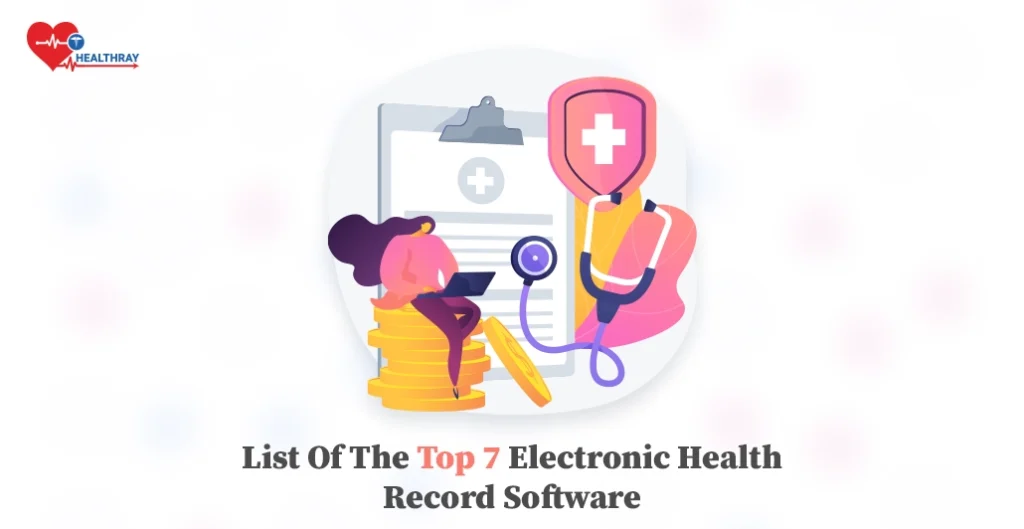
Healthray
Healthray can be acclaimed as one of the best electronic health records software that assesses the unique needs of each healthcare professional. Along with Electronic health records (EHR), it also provides solutions like HIMS, LIMS, and others. Its EHR helps doctors enhance patient care, streamline data management tasks, and be ahead in the evolving landscape of medicine.
Their EHR software seamlessly integrates with other medical systems, which ensures efficiency and accuracy in tasks. Treatment plans, appointments, and patient records are some of these responsibilities. Along with an intuitive interface, Healthray ensures an optimized workflow, helping doctors solely focus on patient care. As per the national coordinator for health, it is one of the best solution of an EHR.
Healthray is an exceptional electronic health records company. India software is undoubtedly worth giving a chance as it has quality services and guarantees satisfaction as well. Along with this, it has a lot to offer, such as
- Better medical care
- Better organization of the clinic
- Eliminate handwriting mistakes
- Enhanced quality of work.
- Managing patient information
- Alerts are sent for updates.
- Better collaboration
Epic
Epic is one of the best full-stack medical record software that carries out all the functions. No matter if you are a single-handed practitioner or a director at a bigger university hospital, this software makes it easier for you to manage workflow truthfully.
Epic’s standard user interface has a design ethos that is built to improve the patient experience with the help of virtual consultations, referrals, insurance vetting, and even remote monitoring. It helps you keep the vitals of a patient at your fingertips. Patients can easily access their medical history, get alerts, and make easy payments through any mobile application.
The features of the Epic can also be counted as its downside when it comes to smaller practices. It has a high range of options for customization that can help in unlocking the product along with the ecosystem as per cost. As per your needs, the cost for Epic can increase from 2X to 100X.
The features of Epic can be equally demanding for healthcare providers to learn them, along with a third-party tool for adoption. Hence, you might have to get a learning program for your team to speed up.
Praxis
Praxis functions veritably else from popular EHR systems. In discrepancy to the conventional approach, which involves EHRs cross-referencing patient data with a medical database, Praxis leverages artificial intelligence to identify trends in patient judgments, enabling speedier client service while still taking unique circumstances into account.
Simply put, it learns and gets smarter the further you use it. With that prophetic intelligence, it can fluently and minimally give fever recommendations for a case of Mediterranean hemorrhagic fever rather than a case of the typical cold wave.
Whether you are an experimenter, a medical director for a sanitarium lot, or a leader at a new clinic, Praxis may be acclimatized to your use case and integrate with third-party EHRs. Additionally, it supports a variety of specialty, including chiropractic and cardiology.
Kareo
An EHR system called Kareo Clinical was created to help independent, lower medical practices in managing their whole workflow. It provides an expansive dashboard filled with maps, lanes, KPIs, and to-do lists for health information.
HIPAA- biddable videotape conferencing, making it simple to expand into the telehealth industry. In addition to a billing gate for online payment processing, a secure online case gate allows cases to examine their health records, treatment plans, patient documents, and dispatches. Itemized charge bills that break out charges according to the treatments and conventions the case has taken
Kareo Clinical supports cross-clinic data transfers, and cases can telegraph or directly communicate with a new doctor with part or all of their medical information( in an XML train) via Kareo’s platform.
Meditech
A plethora of capabilities are available in the Meditech Expanse EHR system that are intended to help healthcare associations.
Providers can use Breadth to produce and communicate conventions within departments on a single platform, taking into account probable medicine responses, disinclinations, and contraindications.
Give cases with accessible access to their conventions, movables, and medical histories; Breadth facilitates patient transfers to new doctors and conventions while clinging to assiduity data participating protocols like FHIR and HL7.
Conduct consultations and use virtual case monitoring to keep an eye on your cases’ blood pressure, heart rate, and glucose situations.
Control your invoicing, claims, and profit cycle to get precise fiscal information before treatment and lower your tone-pay debt.
Meditech looks to be more expensive than some of its competitors (about $397 per physician each month). Nevertheless, it provides a more comprehensive health tech stack and strives to be a comprehensive offering for experience management in larger businesses overall.
Cerner
Cerner is one of the excellent enterprise EHR systems that is built to meet the needs of large-scale organizations. It can be helpful at places that have higher headcounts, a better customer base, and a higher level of technology tools in use. It offers the following features:
Better integrations & third-party plugins with the help of API
Clinical documentation is under one roof where providers can easily create documents for patient encounters. They can do so with the help of ready templates and workflows for better processes and fewer errors. Hence, it has an extensive electronic health records database.
By linking cases and providers for remote monitoring, cases can admit virtual care.
A comparatively cheap entrance figure for medical installations employing an abundance of interpreters
Significant healthcare associations, including Oxford University, Mayo Clinic, Kaiser Permanente, and the Stagers Administration trust it.
NextGen Healthcare
NextGen is known to provide a better stack of healthcare tools for more straightforward patient communications, reporting, billing, and sharing data between providers. It might be beneficial throughout the whole healthcare process. NextGen is helpful in pre-qualifying patients, verifying their insurance, scheduling and conducting virtual sessions, prescribing medications, and submitting insurance claims. Read our article to Electronic Prescriptions Software for a better idea of managing operations.
Conclusion
The top 7 EHR software programs are keystones of effectiveness and creativity in the administration of healthcare. These platforms give medical interpreters all the tools they need to collaborate flawlessly and lessen the standard of patient care. These electronic medical records, which have sophisticated features for data operation, decision backing, and patient involvement, are essential to the delivery of contemporary healthcare. Not only do they digitize information, but they also change the healthcare terrain by encouraging delicacy and availability and, in the end, perfecting issues for both the cases and the healthcare interpreters. Espousing these software programs is a big step in the direction of a healthcare ecosystem that’s further intertwined and effective.
